- Home
- Iris Murdoch
The Red and The Green Page 20
The Red and The Green Read online
Page 20
‘Any rational person would be frightened of that.’ She pressed his hand, kneading it comfortably between her palms.
‘It’s good to talk to you.’
‘You’re a lonely chap really, aren’t you? I wish you were staying here, there’s a lot I could do for you! I must cheer you up, though. Don’t you feel, even now, a little tiny bit pleased to be free, pleased to think that after all the big wide unpredictable world lies in front of you?’
‘No, I just feel utterly wretched.’
‘Well, it’s a bit early. But that feeling will come. God, if I were your age and free, knowing what I know now! Si la jeunesse savait, si la vieillesse pouvait!’
‘But you aren’t in the least vieille, Millie, and I’m sure you can pouvait anything you like.’
‘You’re very sweet. Let me kiss you.’
The silky mauve knees edged a little over the khaki knees and Millie put her arm round Andrew’s neck. She drew his head down towards her and kissed him on the cheek. Then shifting her arm to his shoulder and sliding more closely up against him she kissed him on the lips.
Andrew accepted her kiss with a kind of surprise. He had been conscious of her as a diffuse, warm, comforting animal presence. Now he became precisely aware of her body, aware of its posture and its closeness, of just where it touched his own and how it might be taken hold of. With a hurried gesture, half impulsive, half grateful, he slid his arm round her back and pressed his face awkwardly against hers. Then he drew away in confusion.
They stared at each other. Millie said softly, ‘I didn’t expect this.’ She lifted his hand and laid it against her cheek. ‘There you are—the big wide unpredictable world at its tricks already.’
‘I’m sorry—’ said Andrew.
‘What for? You’ve done me so much good. I’m a disappointed person like you. And a person in a terrible fix. Never mind. But your coming today, and this —it’s part of something just happy and innocent. You aren’t frightened of me, are you?’
‘No.’
‘Then come kiss me, sweet and twenty, and kiss me properly this time.’
Andrew took a deep breath and then as Millie’s body moved to him promptingly he took her firmly in his arms and thrusting her head back against the cushions of the sofa kissed her. It was difficult to let go. Half horrified and half exhilarated, he pulled himself away and stood up. ‘I’m terribly sorry, Aunt Millicent.’
‘There you go again, I shall really slap you in a minute. Do sit down. There at the far end, I won’t touch you. That’s right. Dear Andrew, you’ve altered the world for me. I was utterly miserable when you came. You remember what I said about the scillas being so blue? Well, they weren’t blue, they were grey. They’re blue now. You’ve made them blue.’
Andrew sat down. He felt both alarmed and ashamed, but he could not help also apprehending, in the very glow of his shame, his sheer male power over this handsome older woman.
‘And you know, you know, Andrew, we can’t leave it at that. It would be a crime.’
‘What do you mean?’
‘You said you were frightened of it. You said it might somehow be a failure. Well, let me teach you. With me it won’t be a failure.’
For a moment Andrew did not understand her. Then he stared at her, silent, appalled.
‘I’ve shocked you again. But let me persuade you. There’s nothing wrong in it, no sin, you know. With you and me it would be just innocent and lovely. And it would take away all your fears.’
Andrew looked at her and his eyes were really frightened like those of a scared child. ‘No, no, it’s not—No—’
‘Don’t be a coward, Andrew. It’s a beautiful, wonderful, God-sent chance. Nobody would know. And after that you would be really free. And you would make me so happy.’
‘I couldn’t—’
‘I want you, Andrew. And you want me. That’s something one can’t be mistaken about.’
‘No, really—Millie, I think I’d better be going.’
‘What a cowardy custard you are. But I know I’ve rather sprung it on you. Well, I’ve rather sprung it on myself! And you’re shocked to the core too. Just think about it. But oh, think quickly, my dear and beautiful boy, think quickly!’
They had both risen and Andrew was struggling into his greatcoat.
‘Dear Andrew, you’re not angry with me?’
‘No—forgive me—’ He took her hand and kissed it and laid it against his eyes, bowing before her.
‘Well, I’ll let you go now. Why, I’m still wearing Frances’ ring. I’ll give it back to you now. But when you come, when you really come, you shall give it to me as a present. No, no, sure I’m only joking. Are you going back on that bicycle? Wouldn’t you like to ride back on Owen Roe? You could leave him at the stables in Harcourt Street.’
‘No, thanks.’
She had led him to the front door and out into the damp darkening evening. A little light rain was just beginning to fall. The woolly black-faced sheep had come close to the steps, a crowd of quiet presences. The sky was a thin papery yellow and the peak of Kippure, just lifting above the trees, was jet black.
‘I love it when the animals come right up to the house. You will come back, won’t you, I mean come back anyway, just to talk. Why I’m almost crying, how absurd. There now, dear boy, you move me so—and I envy you. And it’s not your freedom or your youth I’m after envying at this moment, it’s your innocence.’
Chapter Fourteen
WERE there four candles or eight candles, Barney wondered as he knelt in extreme discomfort on the stone floor. He ought to know from the number of the psalm. The fifteen candles, burning upon the triangular candlestick, were extinguished one by one at the close of each psalm. But Barney had long ago lost his place. All he knew was that he had been there some time and that the floor was not only hard but also rather wet from the rain water which had trickled off the mackintoshes and umbrellas of the people who surrounded him. He had been there some time and before that he had been in a bar. He could not remember coming from the bar to the chapel. He had decided after all to come to Tenebrae, or evidently he had decided since here he was.
The chapel, which belonged to a small Dominican community, was a narrow concrete cave, situated off an obscure courtyard in Upper Gardiner Street. Barney knew none of the community, had found the place by accident, and liked it because of the austerity of its furnishings and because it was anonymous and unfrequented. Even now on the Thursday night the chairs provided for the congregation were only half filled. The chapel was entirely dark now except for the sanctuary light and the flickering candles which dimly and intermittently illuminated the two bowed lines of hooded black and white figures stretching away to the altar whereon rose the blurred shape of the shrouded crucifix. In the body of the chapel people knelt here and there in untidy heaps, hunched and sagging in the attitudes of those who have been kneeling for a long time, their mackintoshes piled up beside them. There was a smell of wet clothing and of wet stone.
Tenebrae factae sunt, dum crucifixissent Jesum Judaei: et circa horam nonam exclamavit Jesus voce magna: Deus meus, ut quid me dereliquisti? Barney shifted his knees a little on the floor and then sat back on his heels. In order to be more acutely uncomfortable he had refused himself a hassock, and now his knees felt like two cold alien metal plates rather roughly attached to his legs. His thighs ached, his shoulders ached, and there was a little creeping chilly pain in the small of his back. He resisted the temptation to sit sideways on the floor. He screwed up his eyes to look at the candles again and decided there were four of them.
The intoning of the brothers continued monotonously, expressionlessly, wearily. The penitents were huddled upon the floor, a few of them peering at the words in their books, but most of them humped in attitudes of stupefied abandonment induced by spiritual misery or physical discomfort. What does it all mean, thought Barney. Why had he come here? Wasn’t it the same to him now whether he was here or in the Mountjoy bar? His emotions
were the same, the familiar round of his intentions and compulsions the same. He could have enacted all this elsewhere. Even here it was only play-acting, only, despite the dull voices of the brothers, despite the pain in his knees, indeed because of these things, a kind of cosiness. He was no stranger to remorse. Bitterly every day he regretted what he had done, bitterly he regretted what he was doing in the moment when he lifted his hand to do it. And the power to change himself by an iota was simply not included in the complex that he was. That power, if it existed, resided in some other world, and since it was not native to him it could not help him. Then he must cast himself on God’s mercy. But could there be such a thing; was it not, must it not be, a contradiction? Could a perfect being be merciful to what was imperfect? If he were to go there would he not simply be burnt up automatically? Ego autem sum vermis et non homo.
Barney wondered if he ought to go to confession. Well, of course he ought. Yet now the great austere impersonal machinery of the Church which had once so much drawn him seemed a hollow clattering mumbo-jumbo. Perhaps he had never become entirely used to the sacrament of confession. He could go at random to some unfamiliar priest, interrupting him in his perusal of the Irish Times, and kneel down and whisper some vague uncriticized account of what he had been doing and receive a flimsy penance and a preoccupied absolution. But he ought to be interrogated, he ought to be beaten. Punishment had no meaning where there was no personal relation between the punisher and the punished. And only punishment, it seemed to him, could now reintegrate him into the order of love. He would have to be punished by God Himself, nothing less would serve. Quoniam ego in flagella paratus sum.
How can guilt be taken away, how can it not drag the guilty one down and down? Did redemption exist, could it exist, was it not a strictly senseless idea? Could another save me by his suffering? If someone who is good suffers because I am evil and I see and contemplate that suffering might that not alter me and purify me almost automatically? But such contemplation is impossible precisely because I am evil. Human beings cannot look at affliction with uncorrupted eyes. If the suffering of a good person on my behalf could redeem me Kathleen would be an instrument of my salvation instead of being, as she is, an instrument of my damnation. O vos omnes qui transitis per viam, attendite et videte. But though he might look and look he could not really attend and see. The spectacle of Christ crucified changed nothing in his heart.
Why should not the sight of any innocent suffering have power to save? He remembered live fowls he had seen in the market, their legs tied together, thrown into dusty corners. Every hour, every second, the young rabbit squealed in the jaws of the fox, the owl flew silently through the night with the vole hanging limp from its beak. He knew of these things, this terrible knowledge was in him as it was in all human beings. But because of his own darkness it was all turned to darkness too and not to light. The appalling tenderness and guilt he had felt before the helpless creatures in the market made him in the end turn away with a curse. That the innocent suffer: this should startle the spirit into a self-denying purity forever. But instead there is only the callous indifference of a guilt felt to be ineradicable. He was on the side of the bad thief. Me minavit et adduxit in tenebras et non in lucem.
Was not even the bad thief saved perhaps in the end? Yet what could save him? It is as oneself that one must be saved, and not as another, if salvation has meaning at all. Barney could see plainly, as if a surgical light had been shone within him, that the machinery of his virtuous intent was simply not attached to the living animal that he really was. Nothing that moved here touched the great powerful thing underneath which went its way regardless. It was the strength of that thing, its fat strength, which made him despair. He had thought of himself as a man haunted at least by goodness, but these hauntings were merely the bog fires of his own psyche. His ‘good resolutions’ were not even play-acting, they were babbling. He did not know what the word ‘good’ meant. It was a parrot cry in his mouth. His whole substance was fit only for burning. Non est sanitas in carne mea a facie irae tuae, non est pax in ossibus meis a facie peccatorum meorum.
Barney had not yet made up his mind to tell Frances about Christopher’s intentions. He wanted to desperately, if only in order to be able to act somehow in a situation which tortured him. He told himself that it was his duty to bring the truth out into the open so that everybody should be able to understand what they were doing. But ought people always to understand what they were doing and would that anyway be the result in this case? How was he, sunk in the muddle of his own life, to distinguish between virtuous truth-telling and wicked trouble-making? Frances would be extremely upset. But what would she do? She might postpone her own marriage and prevent her father’s, both things which Barney wanted. Then what would Millie’s vengeance be? Could he hope to survive as Millie’s favourite? It was too risky. Yet how tempting it was to tell Frances and see what happened. Had he really anything to lose? These debates, which usually began on a high moral level, ended inconclusively with the yapping and scratching tug-of-war of different forms of self-interest.
Of course there was one way in which Barney could be fairly sure that in telling Frances his motives would be good, and that was if he really resolved to give up Millie. It was odd how often he came back to this idea, odd considering how sunk he was in his devotion to her, sunk and drowned like a fly in treacle. It was meaningless to think of giving her up. Yet, quite abstractly, he would think of it again; and he would think of it because he knew perfectly well that what utterly poisoned his life was the beastliness of his relation to Kathleen. Kathleen was his wife, she was there, with the authority of an obligation which was rooted so deep in the nature of things that it continually compelled the attention if not the respect of the corrupted will. Kathleen could not be ignored, got round, shuffled away to suffer quietly in a dusty corner like the poor birds in the market. She could not suffer quietly, however silent she was, because she was a human being to whom he was irrevocably bound and he had to see her suffer, he had to see himself making her suffer.
There was no limit to his offence against her, or the limit came only with the limit of himself. Everything he was, was offence. It was the sense of this which made him despair and curse. She seemed to turn every part of him into the stuff of his own damnation. His Memoir, into which he had put so much of his creative power and which had proved such a consolation, was in the end simply a weapon against Kathleen. There had to be somewhere which was safe from her, some place where he was justified and she was judged. In real life she was all judge, even when she said nothing. In the Memoir everything was reversed and the unfairness of life was done away with and that dreadful power was quenched. There were times when the Memoir seemed to Barney the only clean and clear thing in the world. Yet there were always other times when he knew that it was a sin, perhaps his greatest sin, the final corruption of what might have remained unstained, his intellect, his talents. What he wrote in the Memoir was not quite true, and that ‘not quite’ was the stuff of a most wicked lie. Vinea mea electa, ego te plantavi. Quomoda conversa es in amaritudinem ut me crucifigeres et Barabbam dimitteres?
* * * *
Barney opened his eyes. He was sitting sideways on the floor and leaning against the next chair which he had pulled towards him. His head and arm were resting on the chair. He must have fallen asleep.
The chapel was dark and silent and empty. The office had ended and everyone had gone away leaving him there sleeping. The plain walls of the chapel seemed like a dark tunnel at the far end of which the sanctuary light flickered dimly, seeming to give out no illumination but to be a light completely surrounded by darkness up to the very confine of itself.
Barney looked at the light. The last thing he remembered before sleeping was that piercing reproach, Vinea mea electa. .. It seemed to him that it was the most annihilating reproach in the whole world. Yet why was it so? Because it was also, in a way which one could not possibly mistake, the voice of love. Could reproach and
love become so nearly identical? Yes, for this is the nature of the magnet by which what is good draws what is partly evil, by which perhaps mysteriously it may even draw what is wholly evil. The light cast from a perfect centre cannot but define what is imperfect in a revelation which is both rebuke and summons.
Barney returned to his knees. He was extremely stiff and cold and his head ached. It must be very late now, perhaps it was already the morning of Good Friday. He stared at the sanctuary light and felt the certain almost bodily presence of perfect Goodness. And with this he felt, as he had not felt it before, an absolute certainty of his own existence. He existed and God, opposite to him, existed too. And if he was not, by that juxtaposition, simply dissolved into nothing it could only be because God was love.
At the same moment it also became perfectly clear to Barney that everything which he had dreamt of vaguely as good in some way which simply did not concern him was not only possible but even easy. He could give up Millie, he could tear up his Memoir, he could confess everything to Kathleen and start a new life with her and learn to love her properly. He could make everything simple and innocent once again, and in that instant he knew too that if he lifted so much as a finger to attempt that simplicity and that innocence he would receive, from the other region which had seemed so far away outside him, the inrush of an entirely new strength. He had thought himself so lost, so astronomically far removed that there was no nearer or further any more and no sense in the idea of a way. But all the time he had been held so close that he could not escape even if he would. Quoniam sagittae tuae infixae sunt mihi et confirmasti super me manum tuam.

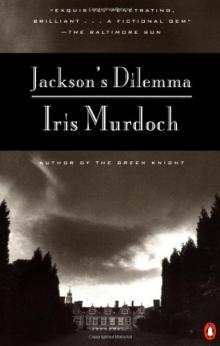 Jackson's Dilemma
Jackson's Dilemma The Flight From the Enchanter
The Flight From the Enchanter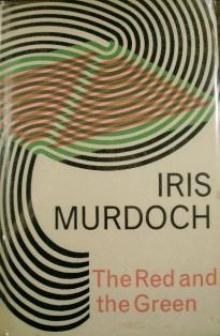 The Red and the Green (Vintage Classics)
The Red and the Green (Vintage Classics) A Severed Head
A Severed Head The Black Prince
The Black Prince The Nice and the Good
The Nice and the Good The Unicorn
The Unicorn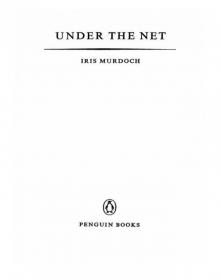 Under the Net
Under the Net The Italian Girl
The Italian Girl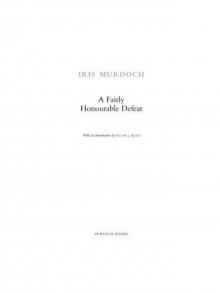 A Fairly Honourable Defeat
A Fairly Honourable Defeat An Accidental Man
An Accidental Man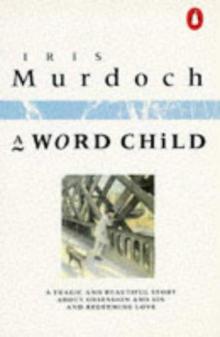 A Word Child
A Word Child The Philosopher's Pupil
The Philosopher's Pupil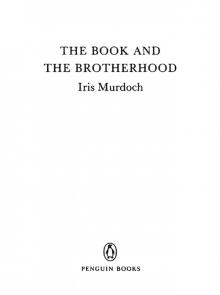 The Book and the Brotherhood
The Book and the Brotherhood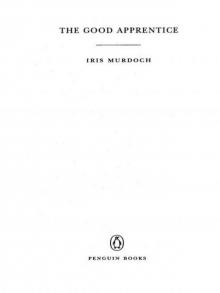 The Good Apprentice
The Good Apprentice The Sacred and Profane Love Machine
The Sacred and Profane Love Machine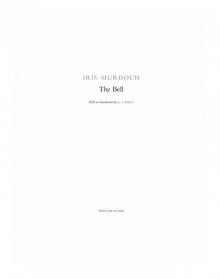 The Bell
The Bell Henry and Cato
Henry and Cato Metaphysics as a Guide to Morals
Metaphysics as a Guide to Morals The Time of the Angels
The Time of the Angels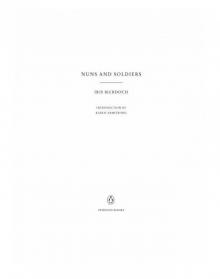 Nuns and Soldiers
Nuns and Soldiers The Green Knight
The Green Knight The Sea, the Sea
The Sea, the Sea Sartre: Romantic Rationalist
Sartre: Romantic Rationalist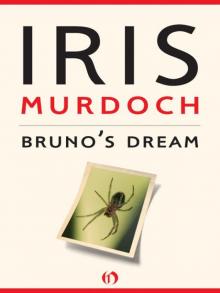 Bruno's Dream
Bruno's Dream An Unofficial rose
An Unofficial rose Sartre
Sartre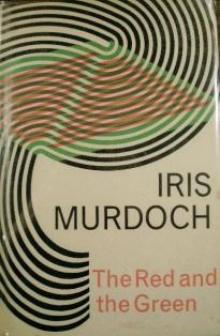 The Red and The Green
The Red and The Green